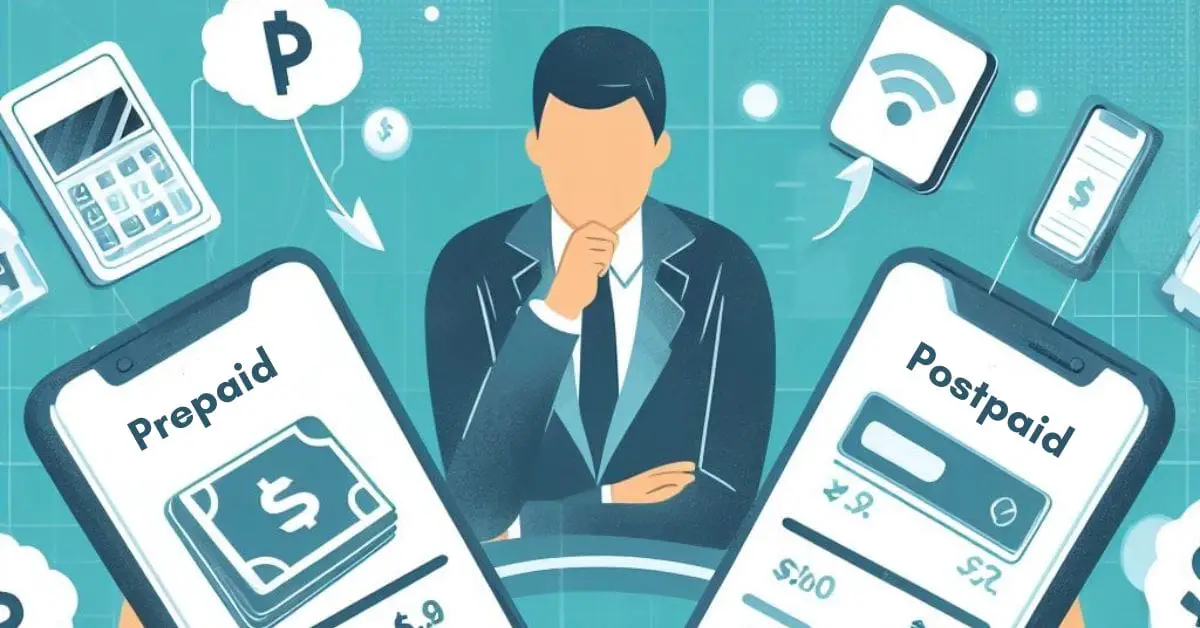In the vast world of mobile plans, figuring out which one’s right for you can feel like a maze. You’ve got prepaid on one hand and postpaid on the other.
When diving into mobile plans, weighing the benefits and drawbacks of prepaid and postpaid options is essential. To help you navigate this, here’s a summary of comparing these two popular choices.
| Key Features | Prepaid Plans | Postpaid Plans |
|---|---|---|
| Payment Structure | Upfront payment for a fixed amount of resources. | Use now, and get billed at the end of the month. |
| Contract Requirements | ⭐⭐⭐No long-term commitments; switch anytime. | Typically locked-in periods (12-24 months). Penalties for early termination. |
| Service Availability | Good domestic coverage; limited international roaming. | ⭐⭐⭐Wider domestic and international coverage; potential roaming charges. |
| Data and Usage Limits | Fixed data allowance; need to buy more when exhausted. | ⭐⭐⭐Often unlimited data (may throttle after a limit); potential overage charges. |
| Cost Structure | Predictable cost: pay for what you use. | Fixed monthly fee; potential for additional charges. |
| Flexibility | ⭐⭐⭐High flexibility; switch plans/providers freely. | Less flexibility due to contract terms. |
| Device Options | Limited top-tier phone availability. | ⭐⭐⭐Access to the latest and high-end devices. |
| Service Quality | Standard service quality. | ⭐⭐⭐⭐⭐Often higher priority during peak times. |
| Extras/Bonuses | Some bundled offers with streaming services. | ⭐⭐⭐⭐⭐Free subscriptions, VIP services, etc. |
| International Capabilities | Selected international calling may have additional charges. | ⭐⭐⭐International talk and text are often included; watch out for roaming charges. |
We will dive into the nitty-gritty details of each plan type, comparing costs, benefits, limitations, and more. By the end of this article, you’ll be equipped with all the knowledge you need to make an informed decision.
What Should I Choose?
Let’s look at some common users and what you should choose depending on which category you fall into.
| User Profile | Recommended Plan | Reasoning |
|---|---|---|
| Single Male, Minimal Usage | Prepaid | Predictable costs and no need for unlimited features. |
| Business User | Postpaid | Requires wider coverage, potential for high data usage, and access to the latest devices. |
| Frequent Traveler | Postpaid | International capabilities and roaming features are beneficial. |
| Teenager (with parental control) | Prepaid | Allows parents to control expenses and usage. |
| Heavy Internet User | Postpaid | Unlimited data and higher priority during peak times are essential. |
| Privacy-Conscious Individual | Prepaid | No need for credit checks or sharing extensive personal details. |
| There is no need for credit checks or sharing extensive personal details. | Prepaid | Predictable costs with no unexpected charges. |
| Tech Enthusiast (wants latest devices) | Postpaid | Access to the latest and high-end devices. |
| Casual User (occasional calls/texts) | Prepaid | Cost-effective for minimal usage. |
| Entertainment Lover | A person with Tight Budget | Some postpaid plans offer free subscriptions to streaming services, but prepaid might also bundle offers. |
The Basics of Mobile Plans

Regarding phone plans, a decision is made between prepaid and postpaid. I’ve noticed that the choice often depends on personal circumstances and preferences.
First up, we’ve got prepaid mobile plans. Just think of these as your pay-as-you-go option. You’ll load up your account with a certain amount of cash, and then when you make calls, send texts, or use data – it’s all deducted from that balance. It’s like having a bucket full of minutes and megabytes you can dip into whenever necessary.
Now, let’s switch gears and talk about postpaid plans. The deal here is pretty straightforward – use first, pay later. It does sound appealing, right? This plan has a fixed monthly fee, usually including calls, texts, and data.
Understanding the Pros: Prepaid vs. Postpaid Mobile Plans
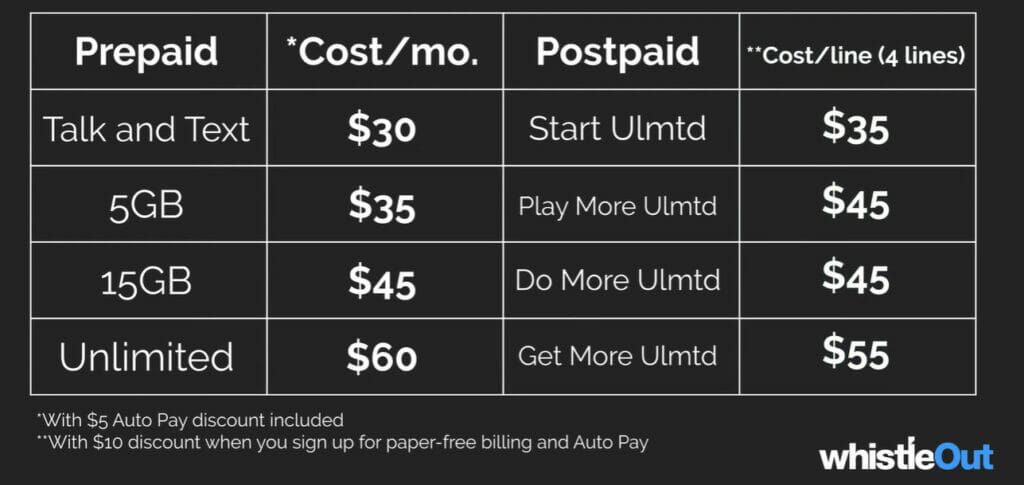
In today’s world, choosing a mobile plan requires careful consideration due to the wide range of options available. Prepaid and postpaid mobile plans are two prominent choices.
Both provide connectivity, but they serve different purposes and have distinct advantages. Let’s examine the benefits of each.
Advantages of Prepaid Plans
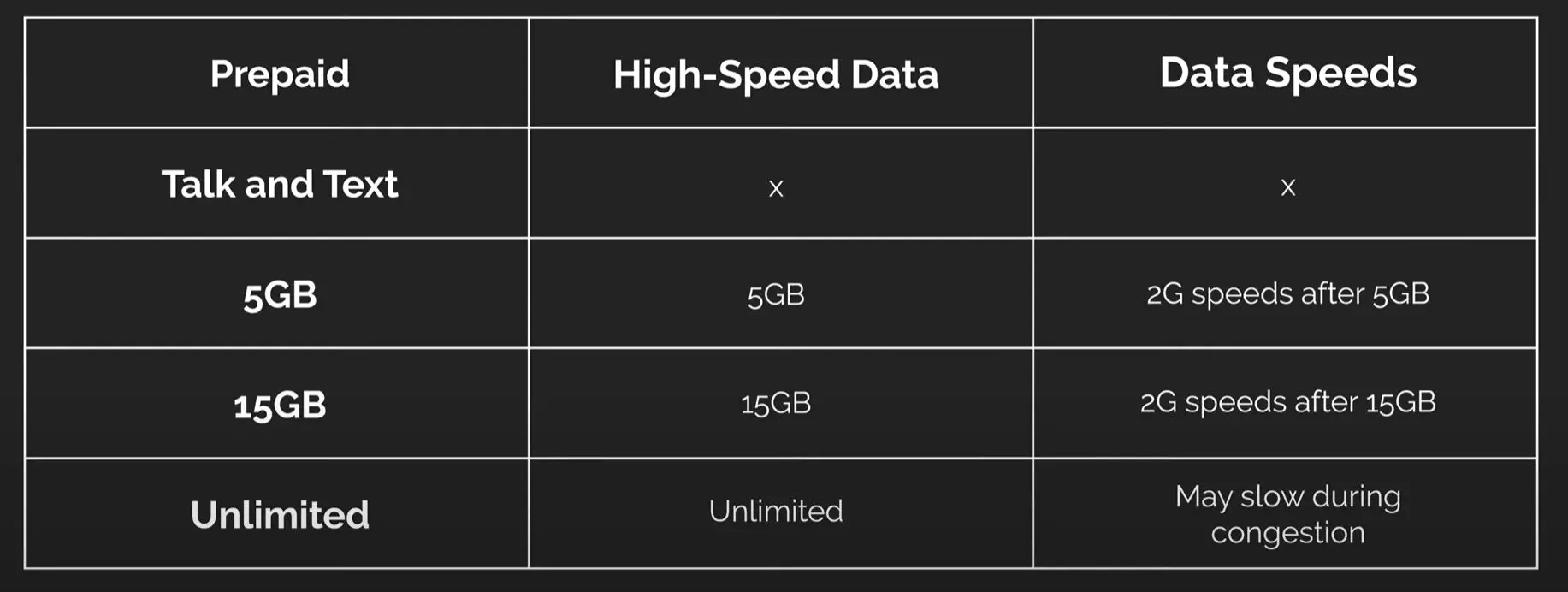
Imagine having the power to control your expenses, know exactly what you’re paying for, and avoid those unexpected bills at the end of the month. Dive into the world of prepaid plans and discover their freedom and flexibility. Let’s break it down!
- Total control over your budget. There’s no surprise bill at the end of the month because you’re paying upfront for a set amount of data, minutes, and texts. You know exactly what you’re spending and when. It’s as predictable as sunrise – no unexpected charges, no overage fees.
- Commitment. With prepaid mobile plans, you’re not locked into any long-term contracts. Don’t like your current plan? No problem! You can switch providers anytime without worrying about termination fees or penalties.
- Privacy. There is no need for credit checks or sharing personal details to sign up; most times, all you need is cash in hand and a phone ready to be topped up.
- International calling included. Many prepaid plans offer the convenience of international calling as part of the package. This means no extra charges or surprise fees when you connect with someone overseas. It’s a straightforward way to keep in touch globally without worrying about the bill.
- Bundled offers with streaming services. This can provide additional value, allowing users to enjoy entertainment as part of their mobile package.
- Pay-as-you-go flexibility. Users can top up their accounts as needed, giving them control over their spending and usage. It’s a transparent and efficient way to manage phone expenses.
- Parental Controls. Prepaid allows for easy parental control– perfect if you sort out a plan for your tech-savvy kids!
Advantages of Postpaid Plans
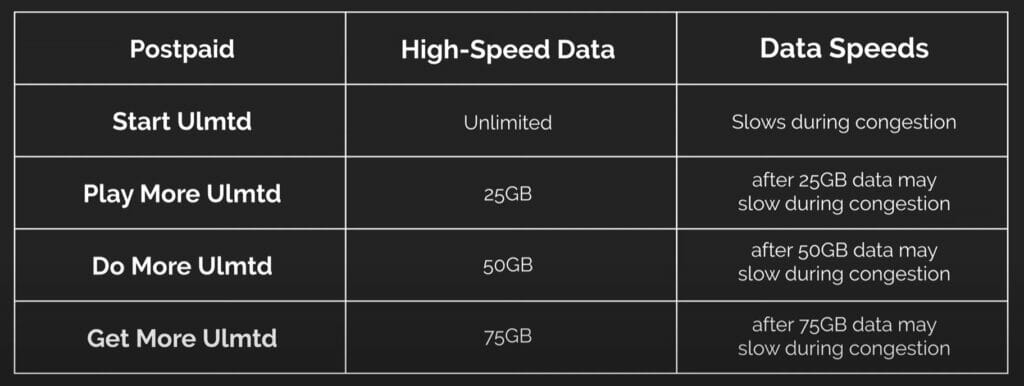
Switching gears, let’s delve into the domain of postpaid mobile plans. In mobile connectivity, postpaid plans often pack quite a punch in terms of benefits.
- Unlimited data that many postpaid plans offer. You’re free to surf the web, download apps, and stream videos – all without worrying about running out of data halfway through the month. This alone makes it an attractive choice for heavy internet users.
- Billing Structure. Unlike prepaid, where you pay ahead, with postpaid, you’re billed at the end of your usage cycle. It’s essentially a ‘use now, pay later’ model that financially gives you some breathing room.
- Service Quality. With postpaid plans, there’s usually a higher priority given to your calls and data traffic during peak times. So when everyone’s trying to get online or make calls at once – say during a big sporting event – you’ll likely experience less congestion than those on prepaid plans.
- Perks. Most providers offer pretty enticing incentives for their postpaid customers, such as free subscriptions to popular streaming services or access to VIP customer service lines.
- International Roaming Capabilities. Many providers include international talk and text in their postpaid packages, making them ideal for frequent travelers or folks with family overseas.
Potential Drawbacks
Now, let’s look at the potential drawbacks of prepaid and postpaid plans. Every coin has two sides, and it’s no different when it comes to mobile plans.
Potential Drawbacks of Prepaid Plans
There’s no doubt that prepaid plans offer a ton of flexibility. But, like any choice, there are some potential pitfalls to remember. Here’s what might get your gears grinding with prepaid:
| Prepaid Plan Drawbacks | Description |
|---|---|
| Limited Usage | Risk running out of data/minutes/texts |
| Limited Device Selection | Many top-tier phones are reserved for postpaid customers |
Potential Drawbacks of Postpaid Plans
While postpaid plans offer continuous service and a broader range of device options, there are specific issues to consider:
| Postpaid Plan Drawbacks | Description |
|---|---|
| Long-term Contracts | Expensive penalties if you break the contract early |
| Higher Cost | They tend to be more costly than prepaid plans |
| Unexpected Charges | Possible additional fees for exceeding data limits |
| Upgrade Restrictions | Typically, they must wait until the contract term ends or pay extra for immediate upgrades. |
Choosing the Right Plan: Key Factors
Dialing into the world of mobile plans can often leave you feeling like you’re stuck in a labyrinth. With prepaid and postpaid options available, how do we choose? Well, it’s essential to understand your needs first.
- Usage. If you’re someone whose phone is practically an extension of your hand, a postpaid plan might be for you. They’re perfect for heavy users with unlimited talk time and generous data allowances. Conversely, a prepaid plan would be more cost-effective if your device primarily serves as an emergency lifeline or for occasional use only.
- Budget. I can’t stress this enough – always choose a plan that fits comfortably within your monthly budget. Postpaid plans are typically pricier but offer more features and convenience; there is no need to constantly top-up credit or worry about running out mid-call! Prepaid plans have lower upfront costs and allow better control over expenses since you pay-as-you-go.
- Flexibility. Prepaid plans win hands down here. You can switch providers or change plans without being tied down by contracts typical of postpaid arrangements.
- Network coverage. In areas where you’ll use your phone most frequently – home, office, or maybe even that secluded picnic spot! Both types of plans are subject to network availability and strength.
Trending Features in Mobile Plans
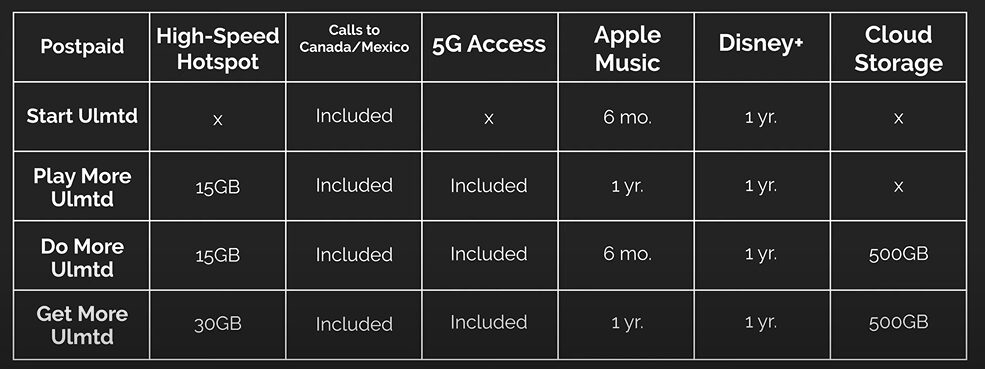
Explore the latest advancements in mobile plans and understand which features significantly impact how we communicate today.
- 5G Connectivity: We’re not in the 4G era anymore! 5G is offering lightning-fast data speeds, and it’s revolutionizing the way we connect.
- Unlimited Data: Say goodbye to counting gigabytes. Many plans now offer unlimited data, letting you surf and stream to your heart’s content.
- Family Share Plans: Bundle up! Combine multiple lines for your family under one plan, often with shared data pools and discounts.
- Cloud Storage: Safeguard those precious memories! Mobile plans now offer cloud storage options to back up photos, videos, and more.
- Enhanced Security: Lock it down! With rising cyber threats, mobile plans have added security and encryption features.
- Streaming Perks: Binge-watchers rejoice! Some plans include subscriptions to popular streaming services or offer zero-rating for specific apps, so it doesn’t affect your data.
- Rollover Data: Didn’t use all your data this month? No worries. With rollover, unused data carries forward to the next billing cycle.
- International Features: Crossing borders? More plans include international calling, texting, and even data in their packages, making it easier to stay connected globally.
Frequently Asked Questions
- How do credit checks factor into my plan choice?
- Most providers require a credit check for postpaid plans since you’re essentially getting a month of service on credit. Prepaid plans, however, typically don’t need a credit check, making them more accessible if you have credit concerns.
- Can I keep my current number if I switch between prepaid and postpaid or vice versa?
- Yes, in most cases. “Number portability” allows consumers to keep phone numbers when switching carriers or plan types. However, confirming this with your provider is always a good idea.
- How quickly can I switch between the two plan types?
- Switching typically doesn’t take long. For many providers, it’s a matter of updating your account settings. However, if you’re locked into a contract with a postpaid plan, you may face penalties for switching before your contract ends.
- Are family or group plans available for both prepaid and postpaid?
- Yes, many carriers offer family or group plans for both prepaid and postpaid. These plans allow multiple users to share resources, often at a discounted rate compared to individual plans.
- Is the call and data quality the same for both plan types?
- In terms of pure quality, there’s no difference. However, postpaid users might get priority during peak times, resulting in slightly better service. Always check provider specifics, as this can vary.
- What’s the deal with “rollover” minutes or data?
- Some providers, particularly for postpaid plans, offer rollover features where unused minutes or data from one month carry over to the next. This isn’t as common with prepaid plans, as unused resources typically expire at the end of the billing cycle.
- Can I switch my plan type with any carrier, or are there restrictions?
- While many carriers offer the flexibility to switch between plan types, it’s not universal. It’s essential to discuss this with your intended provider beforehand.
- How do promotional offers factor into my decision?
- Both prepaid and postpaid plans can come with enticing promotions, like extra data or discounted devices. It’s essential to read the terms carefully and decide if the promotion aligns with your long-term needs or is just a short-term perk.
- Is there any advantage to having both a prepaid and postpaid plan?
- Some people opt for both to separate personal and business use, or to have a backup option if one plan runs out of data or minutes. It all boils down to individual needs and preferences.
- If I choose prepaid, do I miss out on customer service benefits?
- While postpaid customers might get certain perks, such as priority service lines, most carriers still provide comprehensive customer service to both prepaid and postpaid customers.
References
Website Resources:
- WhistleOut. https://www.whistleout.com/
- PCMag. https://www.pcmag.com/
- CNET. https://www.cnet.com/tech/mobile/
Video References:
Academic Gain Tutorials
WhistleOut

